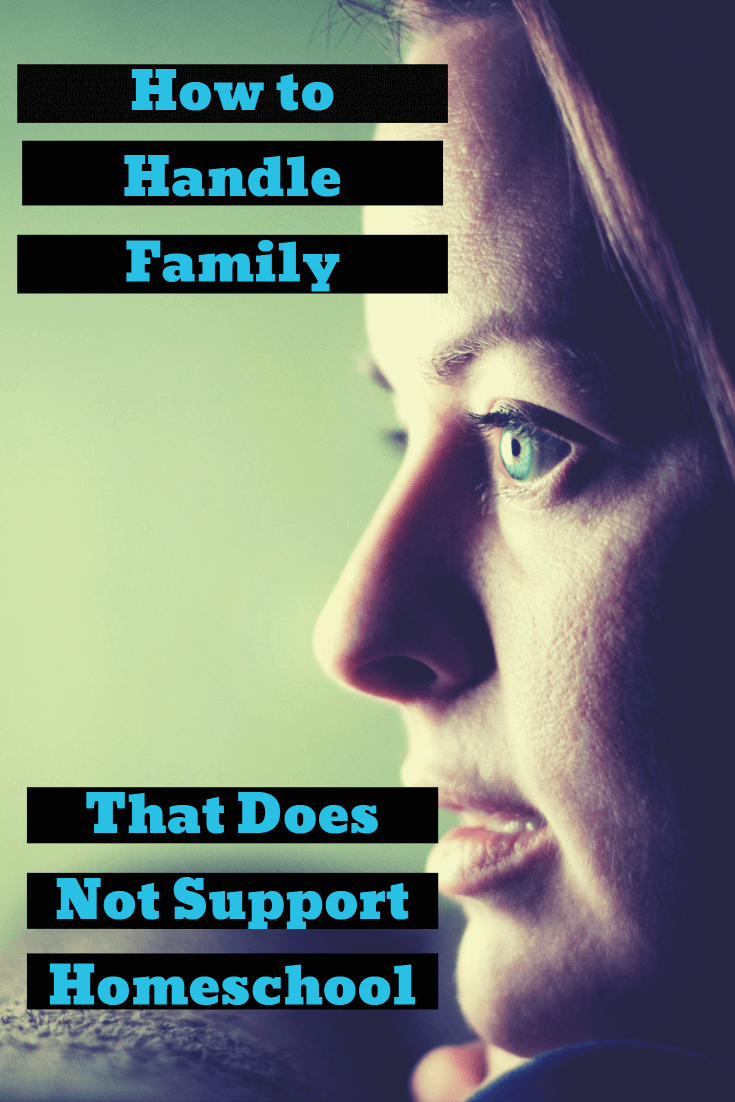How to Respond When Your Family Doesn't Support Your Homeschooling

Choosing to homeschool your child is likely not a decision you made quickly or lightly. You discussed, researched, evaluated if your family dynamic could support the endeavor, sought feedback from homeschoolers, and discussed more.
Homeschooling usually involves some changes to your former lifestyle—you may have cut your family’s budget, if you’ve become a one-income family, in order to homeschool. You might be forfeiting some of your free time in favor of spending almost all your time with your children.
This all-important endeavor is close to your heart and you do not take it lightly. So, it can feel quite off-putting to have family members disapprove of your choice to homeschool. Their negativity can make the road tougher, depending upon how they approach their feelings about your decision. And, make no mistake, there are a variety of ways their negativity can play out.
Luckily, you choose how you react.
Here are the most common types of unsupportive relatives (and friends) you may encounter during your homeschooling journey.
The open critic
This is someone who directly questions and criticizes your choice to homeschool. They might often talk about homeschooling not being “normal” or share their fears that your child might not be “properly socialized” because they do not attend a brick-and-mortar school. They feel free to openly express their disapproval to you at every turn.

While this relative gets points for at least being authentic, their comments are not appreciated. You have a few options for how to deal with this condemnation.
First, you could simply ignore it; after all, you are parenting your child, not them. So, who cares what they think?
A second option is to engage their questions and criticism with all that you’ve researched and experienced in your homeschooling journey. Educate them.
If you’re feeling more along the line of wanting to confront but not wishing to have to explain yourself, then a third option is to directly rebuke their comments with something like:
We appreciate that your comments come from caring; however, we are raising our children and will do it as we feel best. Please do not comment any further on our decision to homeschool.
The secret cynic
The secret cynic is a person who doesn’t share their disapproval with you directly. Instead, their feelings may remain as unexpressed frustration with your choice, manifesting itself in their apparent total lack of interest when you mention your homeschooling.

They’ve decided they’re not even going to justify your homeschooling with any of their time or attention in hearing about it. If this is the case with your relative, it’s not a bad spot in which to be, since they aren’t openly challenging your choice.
When dealing with a secret cynic, it’s often best to just let sleeping dogs lie. On the other hand, if a family member chooses to share their negativity about your choices behind your back to other family members or friends, this can cause problems. You can either ignore this behavior or confront it much as one would face the open critic:
I’ve heard from other family members that you’ve expressed disapproval about our homeschooling. If this is true, we ask that you be respectful of us and our choices by not criticizing us behind our back or directly to us.
Yes, see that last bit? That sort of cuts them off at the pass should they decide to instead take their complaints directly to you.
The passive-aggressive naysayer
These personality types can be the most challenging with which to deal. They are adept at making passing remarks or engaging in actions might appear thoughtful or helpful on the surface, but are just the tip of a massive, disapproving iceberg.

These are these folks that will quiz your kids on their knowledge or continuously give you unsolicited advice about homeschooling, curriculums, and socialization—as if they are experts. They might report to you after the fact the contents of a supposedly casual discussion they had with your child, assessing how knowledgeable (or not) they deem your child to be. And because they are so practiced with their passive-aggressive comments and actions, they’ll often deny that they’re doing anything objectionable if you confront them.
No, I’m not questioning your choice of homeschooling style. How could you think that? I’m helping you do what’s best for your child…
It could be best to non-confrontationally address offenses as they occur. For example, if a relative loves to quiz your kids, gently redirect them with a sing-songy comment like You’re here to visit your grandkids. Just enjoy them. Or, Hey, this is the kids’ vacation, too—let’s just have fun.
Since these family members don’t want to get into any sort of discussion that will reveal their true feelings on the subject, this approach generally works.
The open-minded skeptic
Of course, anyone who is at all flexible is the best type of doubting relative to have. While they might be direct or indirect with their doubt, the key with them is that they are open-minded—which means they are broadminded enough to be educated about homeschooling and understand why you chose this route for your family.
This personality is open to the possibility that their initial opinion of homeschooling may be incomplete, wrong, or misinformed. Generally, you can be open and willing to share your reasoning for and experiences with homeschooling. At worst, the “open-minded skeptic” may not be completely onboard with homeschooling. But they are probably rooting for you and your family because they love you.
Nobody enjoys disapproval (especially from family or close friends). However, there is a silver lining: these types of relatives can actually provide a learning experience, as you’ll likely reexamine and reaffirm what you do, while discovering and mastering ways to interact with those who don’t fully agree with you.
What types of family members have you encountered? Comment below!







Leave a Reply